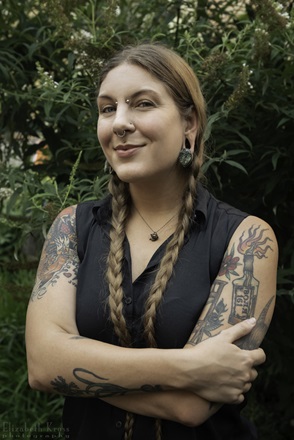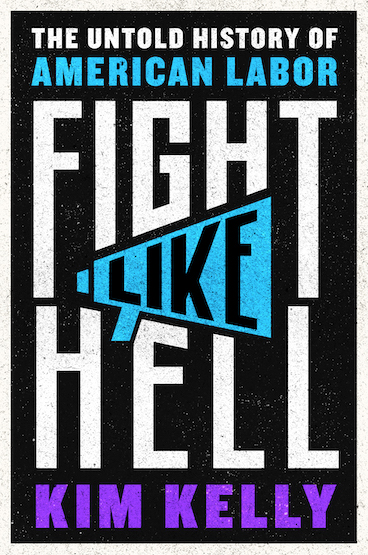Meet Kim Kelly, Author of “Fight Like Hell: The Untold History of American Labor”
by Sarah Hojsak
April 26, 2023

According to journalist and author Kim Kelly, organized labor is our birthright. Kelly published her first book, “Fight Like Hell: The Untold History of American Labor,” in 2022—but she never expected to become a labor writer.
After attending Drexel as a student in the music industry program, Kelly toured with bands and worked as a music journalist. While serving as the heavy metal editor at VICE’s music platform Noisey, she got involved in the workplace’s efforts to unionize. Having grown up in a union family, she found that telling the stories of the labor movement was a natural fit.
Today, interest in organized labor is at an all-time high—but labor history is a crucial part of our past that is often left out of the textbooks. “Fight Like Hell” explores labor history across eras and industries, lifting up stories of marginalized groups that have previously been excluded from the mainstream labor narrative, including women, people of color, LGBTQIA people, incarcerated people and sex workers.
“The experience of being a worker is about as close to a universal experience as you can get in this country,” Kelly explained. “It's incredibly important to me to share with people what our history actually looks like, what is possible and what has been achieved, and provide blueprints for what we might be able to pull off in the future.”
Kelly will read from “Fight Like Hell,” lead a discussion on the history of unions and conduct a creative nonfiction writing workshop on Wednesday, May 10 as part of the Drexel Writing Festival.
Learn more about Kelly in the Q&A below and find more information on the Drexel Writing Festival here.

Why was it important to you to focus your book on stories that have previously been excluded from the mainstream labor movement?
There's a chapter on disabled workers that dives into the ways the disability rights movement and the labor movement have intersected. That's something that, even as a disabled labor journalist, I had not necessarily come across. I had not come across much writing or research that explicitly dug into the fact that these movements were intertwined in very specific ways. But it’s an important part of our history.
I have chapters on incarcerated workers and sex workers. It is absurd to me that those groups are typically left out of the mainstream labor history narrative, because those folks have always been a part of this history. It’s an important piece of the whole puzzle that I think is left out because some people hold stigma or prejudice against these groups.
Divisions based on race, gender, identity or place of origin keep us from recognizing how much we have in common. The working class has been pulled apart and encouraged to find enmity instead of solidarity, and I reject that. I had an opportunity to write a book that I knew would have a wide reach, and I made sure to take advantage of this opportunity to rectify that, to make sure that these workers get their moment too.
How did you approach researching your book?
I initially had plans to travel to archives and libraries and do a very in-depth type of research that I was looking forward to. But I signed the contract for this right as the pandemic was starting to take root, and it quickly became apparent that I wasn't going anywhere.
It turned into a lot of time on the phone and on Zoom and scouring academic articles that I'd have to ask my friends in grad school to send to me because you can't access them without a .edu email. I tried to synthesize everything into a loosely connected story, but a story that made it very clear how all these different moments and movements related to one another.
It was tougher to research the prisoner's chapter because I couldn't necessarily just pick up the phone and call everybody I wanted to talk to. It's a lot easier to find news of strikes or other actions that the newspaper reports on, but the prison industrial complex has a vested interest in keeping any news of rebellion or protest under wraps. But I was able to talk to people inside and outside who had a deep well of information and really important perspectives. It took me the longest time to research that one, but I think it's my favorite chapter.
What do you hope students take away from your talk at the Writing Festival?
Students are my favorite audiences to speak to, because I wish I had known more about this stuff at that age. When I was in college, I was out here in West Philly drinking 40s and going to punk shows—I was not thinking about the oppression of the global working class. I think people in college now are a lot more tuned in and have a better perspective and understanding than I did at that age. You can get a lot more done when you're 20 than basically any other moment in time. That is a peak moment to get involved in whatever struggle speaks to you the most.
I've been lucky to speak to a lot of college students, and I do my best to share stories from the book and from my research that allow younger people to see themselves in those movements. I show them like, “look, someone just like you was able to move mountains and change the world and have a marked material impact on the working conditions they and their coworkers deal with. You can do the same thing.”
Looking back on your time at Drexel, do you have any advice for current students?
As a music industry major, I had a great time, but I wish I’d taken more advantage of the other resources the university had. Just because you think of yourself as one type of person, or you think you have one abiding set of interests—like, "this is my major, this is my focus"—you're allowed to be interested in so many other things. Let yourself follow those threads out and see where they lead. In your early twenties, you have more leeway than it may feel like. Who you are when you're 20 is probably not who you're going to be when you're 30. And that's kind of fun to think about. So don't stress out too much. It's fine.
What’s next for you?
The paperback of “Fight Like Hell” comes out on August 29, and I'm also working on a young reader's edition. I just completed a several month investigation into the rise in black lung cases in Appalachia among younger coal miners. It’s a really serious public health crisis that's deeply underreported. I'm a freelancer, so I'm always writing. I have my column in Teen Vogue, my column at Fast Company and I guess I've got to work on a proposal for another book. It seems like once you write one, it's kind of hard to stop, at least if you had fun with it. And I had a great time.
Photo of Kim Kelly by Elizabeth Kreitschman